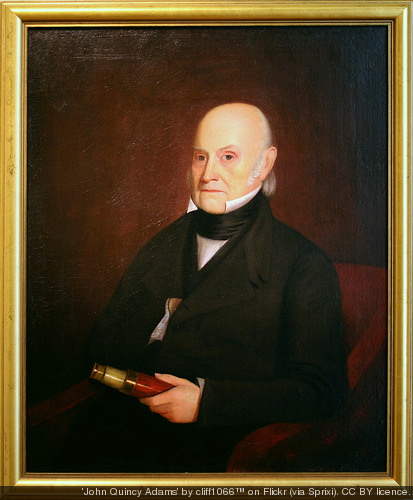


Founding Father John Quincy Adams was a regular attendant at public worship and let nothing deter him from attendance. In his diary (which he faithfully kept for 68 years), his Sunday entries routinely included notes on the sermon he heard that day, who preached it, the passages used, and his own observations about the sermon. His notes after attending church at the U. S. Capitol on April 12, 1840 are particularly interesting.
In 1800, construction on the U. S. Capitol was finished, and when Congress moved in, one of their first acts was to approve the largest room in the Capitol – the Hall of the House of Representatives – as a church chamber. [1] Oversight of each Sunday’s services alternated between the Chaplain of the House and the Chaplain of the Senate, and U. S. Senators and Representatives regularly attended that church, as did U. S. Presidents such as Thomas Jefferson, James Madison, John Quincy Adams, and others. By 1867, the church at the Capitol had become the largest church in Washington, D. C., and one of the largest in the nation. [2]
When Adams attended on April 12, 1840, the Rev. George Cookman, a Methodist minister from England who was Chaplain of the Senate, preached the sermon. Adams reported:
Attended public worship this morning in the hall of the House of Representatives. Mr. Cookman preached from Acts 5:29-32: “Then Peter and the other disciples answered and said, We ought to obey God rather than men. The God of our fathers raised up Jesus, whom ye slew and hanged on a tree, Him that God exalted with His right hand to be a Prince and a Savior, for to give repentance to Israel and forgiveness of sins; and we are His witnesses of these things, and so is also the Holy Ghost, Whom God hath given to them that obey Him.”
What was the effect of that passage and sermon? According to Adams:
Mr. Cookman had just delivered a most powerful, eloquent, argumentative discourse upon the vitality of the resurrection of Christ to the truth of the Christian religion – a discourse which had drawn streams of tears from my eyes – which had fixed a crowded auditory [audience], like so many marble statues, in silent and intense attention, five hundred pair of eyes beaming from the circumference to the center of the hall on one focal point: the preacher’s face. A discourse which, if I had been forty years younger, I would have studied the substance, form, and manner of delivery as a model to imitate. [3]
At the time of this sermon, Adams was well advanced in years and was serving in the U. S. House of Representatives – the only man to go from being President of the United States to being a Congressman. And Acts 5, a passage showing “the vitality of the resurrection of Christ to the truth of the Christian religion,” had a remarkable impact on him. This passage is still loaded with many applicable lessons for Christians today.
(By the way, the Rev. Cookman became Senate Chaplain in 1839 and was instrumental in bringing President Franklin Pierce to faith in Christ. Cookman preached his final sermon at the Capitol on February 28, 1841, announcing to the congregation that he was taking a six-month trip to England to see his elderly father and visit his mother’s grave, and would then return to America – his adopted country for which “he should never cease to offer up daily prayers to heaven.” [4] Less than two weeks later, Cookman set off on his journey aboard the steamer SS President, but the ship was lost at sea with all 136 aboard perishing.)
[1] Debates and Proceedings in the Congress of the United States (Washington: Gales and Seaton, 1853), p. 797, Sixth Congress, December 4, 1800.
[2] James Hutson (Chief of the Manuscript Division of the Library of Congress), Religion and the Founding of the American Republic (Washington, DC: Library of Congress, 1998), p. 91.
[3] John Quincy Adams, Memoirs of John Quincy Adams, Charles Francis Adams, editor (Philadelphia: J. B. Lippincott & Company, 1876), Vol. X, pp. 258-259, diary entry on April 12, 1840.
[4] John Quincy Adams, Memoirs of John Quincy Adams, Charles Francis Adams, editor (Philadelphia: J. B. Lippincott and Company, 1876), Vol. X, p. 435, diary entry on February 28, 1841
Get all of the latest headlines and news as it happens.
Thank for visiting nationalblackroberegiment.com. In efforts to comply with the new GDPR regulations we have created a Privacy Center for your convenience.